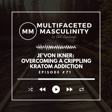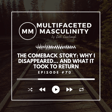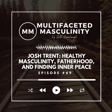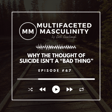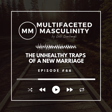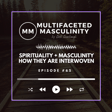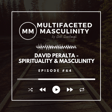Become a Creator today!Start creating today - Share your story with the world!
Start for free
00:00:00
00:00:01

5 Ways to Snap Out of a Funk... and How to Realize You're in One | Ep. #63
We’ve all been there at one time or another… in a funk… in an emotional rut… feeling unclear about how we arrived there and how to dig out of it. Today, we will dissect how exactly we get into funks and, more importantly, the five things we can do to change things.
In this episode you'll learn:
- What leads to being in a funk?
- Why isolation is so detrimental to our wellbeing.
- The five things we can do to climb out of a funk.
- How to put together a detailed game plan.
- Practical action steps we can implement to begin seeing change within days!
Links
Host: Josh Cearbaugh
Website: https://joshcearbaugh.com
Instagram: https://www.instagram.com/jcearbaugh/
Linkedin: https://www.linkedin.com/in/joshcearbaugh/
Online Course: https://www.jumpstartyourlife.com
Transcript
Introduction to Overcoming Funks
00:00:00
Speaker
Today's episode, we're talking about something that I am unfortunately all too familiar with, and that is how to snap yourself out of a funk. I think we've all been there before at differing degrees, but for me, I find that there are certain things that get me into a funk and I'm not talking about grief or major things that are disruptive. I'm talking about just kind of operating with somewhat of a wet blanket over your life, over your mind, over your heart.
00:00:30
Speaker
And it's in those times when your life circumstances are, they, they combine to slowly create a negative impact in your life and they culminate in being in a funk. So the question is, how can you identify when you're actually in a funk? And more importantly, how the hell do you snap out of it and realign with your highest
Exploring Masculinity and Personal Struggles
00:00:55
Speaker
self? Well, we're going to get into all of that today.
00:00:59
Speaker
Men, we are not simple, chest-thumping, rock-smashing, fire-starting barbarians. We have depth. We intensely feel. We are scared, yet brave. We love to have fun. We're imperfect and make mistakes. We're compassionate and loving. We are multifaceted. Let's explore the reality of masculinity together.
00:01:28
Speaker
All right, so today's episode, like I said in the intro, it's something that I've wrestled with, just to be honest with you. I did not have a really healthy model of masculinity from my father growing up. And with that comes having to learn how to find the things that keep me in a good place and really through trial and error. And in doing that over the years, really in my adult life,
00:01:56
Speaker
I have found myself into different funks. I'm just calling them a funk. Now, I'm not talking about clinical depression or grief. Like I said in the intro, this is more like, you know what? You're just not firing on all cylinders. You just feel off. You
00:02:13
Speaker
I don't want to get out of bed in the morning. You don't want to connect with people deep down inside. You do want to do those things, but it just, it feels harder. It feels easier to check out, easier to avoid, easier to run to these coping mechanisms.
Isolation, Self-Care, and Societal Impact
00:02:30
Speaker
And so diving into the topic of getting into a funk, we have to kind of reverse engineer first and foremost, how we get into a funk in the first place.
00:02:41
Speaker
And for me, not just because I'm an extrovert, yes, I am an extrovert, but we need people. And so regardless of whether you're not an extrovert or introvert, if you're not connected to people, then that is one of the major ingredients in getting into a funk and that is isolation. And we've all experienced it, I think to a degree over the last several years with the lockdowns and everything else, there's been a really interesting
00:03:09
Speaker
social experiment on how we're all impacted and affected by isolation. And you can just look around and see how many relationships ended and how many marriages ended, how many children had developmental issues because of that isolation. And so when you're isolated, it's really easy. At least I noticed for me to slip into what I call the toilet bowl syndrome.
00:03:34
Speaker
which is just this downward spiral that builds on one another. It's letting negative thoughts begin to consume you, or more importantly, even not having an accountability. And I'm not talking about accountability like you'd think, not like an AA group or anything like that. I've got nothing against that.
00:03:54
Speaker
I'm talking about accountability that just simply comes from being in relationship with others. When you're at a barbecue, you're having conversation, you're diving into topics, if you're sharing about where you're at, it helps alleviate some of that isolation.
00:04:10
Speaker
You know, another thing that is part of that toilet bowl syndrome is you stop doing self care and it's really easy to let self care get pushed down to the bottom of the priority list, especially when you're juggling a thousand things. I mean, I've got a couple of businesses running. I have five kids. I have a marriage. I have a ranch.
00:04:32
Speaker
There's just a lot going on for me and each one of us. We could probably go down this list of everything that we're trying to juggle. And so slowly but surely, you let that self-care become less and less important.
00:04:49
Speaker
You know, self-care, it's often synonymous with like self-love. And both, they sound great in theory, but practically, what does that mean? Well, it's different for everybody. For me, it's spending time in nature. It's building things with my hands. It's doing yoga, journaling, meditating, microdosing psilocybin, not eating certain foods.
00:05:14
Speaker
reaching out to people that I love. The list goes on and on and on. But for me, self-care are those actions that I take or the self-discipline that I have to avoid certain actions that really keep me in a good place.
Gradual Development of Funks and Early Intervention
00:05:31
Speaker
And so when I'm neglecting that self-care, then it's along with that isolation, right? We're painting a picture of what it looks like to get into a funk.
00:05:40
Speaker
If you slowly become more isolated and you slowly begin to neglect that self-care, then we're helping you understand how you can get into these funks. For me, I think a general rule of thumb when it comes to self-care is it's things that you do that refresh, refuel, or rejuvenate your soul.
00:06:07
Speaker
Stop and ask yourself, what is that? What is that for you that gives you that sense of refreshment, refueling, rejuvenation? Now that may not, it could be an action, like for me, spending time in nature. That's one thing. One that may not seem like it fits into that category is eating certain foods or not eating certain foods. You know, in the sense of refueling me, there there's the soul side of it, but then also just my body, which is directly connected to my mental health.
00:06:36
Speaker
And then when you, when you start to isolate and when you start to neglect those things that keep you in a good head space, then it's really easy to just gravitate towards comfort and.
00:06:52
Speaker
I'm hoping that I can paint this in a way that you're able to see the overarching principle and picture of getting into a funk. It's not just, you know what, you're kicking ass one day and the next day you wake up and you're depressed. This is something that's gradual. And for me, learning how to catch these sooner, how to do things that we're gonna be talking about on the back end of this to mitigate them, or if I find myself in those places,
Challenging Comfort Zones and Importance of Sleep
00:07:21
Speaker
to dig back out of them.
00:07:24
Speaker
is really empowering and important to be able to do. But when you start to get into a funk, that's when you start to want comfort. I think no one wants discomfort. I don't love the feeling of my cold plunge as an example. But I do love the feeling that I get when I get out of the cold plunge. I feel awake, I feel rejuvenated, I feel alive, I feel
00:07:53
Speaker
Awesome. I'm ready to take on the world, but more times than not, I'm literally standing there. One of the things that I do with my ice bath is I'll set a timer for four minutes and 15 seconds. And then I stare at that timer and I, my goal is to do it for four minutes, but I will watch that 15 seconds tick down. And then I'm like, okay, 10.
00:08:16
Speaker
Nine, eight, I gotta like psych myself up because I don't want to feel uncomfortable, but it's important for me to kind of tackle that mental hurdle of getting over that and then pushing through that. And that's just one really practical thing that I do to help mitigate from getting into these comfort funks. Because, you know, it's that spiral, right? It's that toilet bowl spiral. When you don't challenge yourself, then it's much easier to eat comfort foods.
00:08:44
Speaker
then it's more appealing to sit on the couch and watch a movie instead of journal or do whatever that may be able to keep you at a better place. And it's basically gravitating towards comfort instead of challenging yourself and getting outside your comfort zone. It's no secret, right? You're
00:09:08
Speaker
Growth often is hiding in discomfort in some form or fashion. And for me, just as a guidepost, if I feel excitement but I feel afraid, then I tend to lean into that. Not always. There are times that I'm like, oh man, that's really exciting and that's terrifying and I don't think I wanna do that now. Or it takes me longer to kind of conjure up the energy or the excitement to be able to push through that barrier of fear.
00:09:37
Speaker
But another thing that kind of gets you into these funks is you don't guard your sleep. I mean, we spend a third of our life unconscious with our eyes closed, which is really kind of fascinating if you think about it.
00:09:52
Speaker
But your sleep, or lack thereof, can directly affect your mental and physical well-being. You need to guard your sleep almost like it's a commodity, like spending time with your loved ones. If that's a priority for you, you're going to do things to make sure that you set aside time to be with your loved ones.
00:10:13
Speaker
And the same is with sleep. You need to make that a high enough priority where you're proactive in whatever that is for you. We have red lights that we put on in the evening to help with melatonin production. I'm not great at being off my phone leading up to bedtime. But you know what? The times that I do and when I'm more consistent with getting off of my phone an hour beforehand, then lo and behold, guess what? I find that I get better quality sleep, deeper sleep.
00:10:42
Speaker
And especially the older that you get, the harder it is to kind of push through the insufficient sleep. I mean, when I was in the Marines, I could do on, I could operate on very little sleep and just keep going. And then just know, you know what, in three, four or five days, whatever it is, I'm going to crash for 12 hours. And then those 12 hours, I'm going to bounce back and I'm going to feel awesome. Now.
00:11:08
Speaker
If I get a couple nights of bad sleep for whatever reason, I'm much more thrown off. Doesn't mean that I'm not able to operate or function, but you can ask my wife and my kids, I'm a wee bit more cranky or shorter fuse than I normally am. I'm less driven. I have less desire to do the things that I know that are good for me. And they're one of the direct correlations that I've noticed about myself
00:11:34
Speaker
is when I get good sleep, it's much easier for me to challenge myself. It's much easier for me to have the discipline to do the things that I know that I need to do when I'm tired. I'm like, you know what? Screw it. I I'm going to eat that cookie or I'm going to sleep in a little bit later or kind of mosey around, etc. The list goes on and on.
00:11:57
Speaker
And let me also say this, obviously there's a ton of science out available that you can research as far as the importance of sleep, the quality of sleep, et cetera. But you also got to find out what works best for you. What is that sweet spot of sleep for you?
00:12:13
Speaker
Some people, like my wife, she's more of a night owl and not a morning person, which is a challenge on school mornings. But in general, she gets more done in the night. She just kind of goes for me. I wind down at night. I tend to go to bed a little bit earlier. We were just hanging out with some of our friends at the river and it was around 10 o'clock and I'm like, Hey babe, I'm, I think I'm about ready to wind it down and go to bed because
00:12:42
Speaker
I know myself where I naturally wake up sometime between 6 and 6.30 on a regular basis. Now I'll set my alarm earlier if need to, or there may be some days that I sleep in a little bit later, but on average 6 to 6.30.
00:12:56
Speaker
Well, because of that, I try to get to bed between 10 and 10 30 because I have found for me eight hours of sleep is what is good for me to be able to function and operate at a high level and a consistent level.
00:13:12
Speaker
I have other friends that are older than me and they only need about six hours of sleep. And actually the reverse happens for them. If they, if they get too much sleep, if they get eight hours of sleep, it actually makes them feel groggy.
00:13:27
Speaker
Now you could say that there's some science that contradicts that, but for them, they have found what their sweet spot of sleep is and they've adjusted their life around what that is. And so obviously as you get older, like older in age, seventies, eighties, nineties, you're going to be sleeping more and more and more.
00:13:46
Speaker
But when you're in peak production to help yourself stay out of a funk, be aware of how much sleep it is that you need to be able to be in a good place.
Connection vs. Isolation in Managing Funks
00:13:56
Speaker
And then once you find out what that is,
00:13:59
Speaker
Put up safeguards, put up those guardrails to protect that. Find out what that is for you. Is it getting off of your electronic devices at night? Is it that you're more in a flow state at night, but then you make sure that you've got blackout curtains so that you can sleep in a little bit later if your schedule allows.
00:14:17
Speaker
Find what works for you, but make sure just like that self-care priority needs to be high even when you got a lot going on, that sleep priority needs to be high even if you've got a lot going on. And so if you take kind of the mosaic of those primary things, if
00:14:37
Speaker
For me, when I'm not getting good sleep, then it's really easy for me to not want to go to the gym or not go to martial arts or not connect to people. It's easier for me to do those things or more appealing for me to do those things.
00:14:52
Speaker
And so then I begin to isolate. Well, then when I begin to isolate, I begin to not have as good of thought. I get lost in my mind when it comes to feeling like something's too hard or I let fear begin to take over whatever it may be. And then when I do that, then I want to run to comfort. I want to avoid those things and kind of sit in a state of comfort.
00:15:16
Speaker
rather than challenging myself. And there are times where maybe, you know, I find myself in that place for a week or two. There have been times where I wake up metaphorically and I go, holy cow, man, for the last
00:15:31
Speaker
two or three months I've been slowly setting myself up for failure or setting myself up for being in a funk by not doing certain things and then doing certain things and again it's different for everybody but as an overarching rule
00:15:52
Speaker
don't let yourself isolate. Isolation creates so much negativity in your life because you begin to paint those pictures and the things, this is one thing that I've found is certain things that feel overwhelming to me or feel really big to me, they often come when I'm isolating.
00:16:14
Speaker
I often don't find myself talking to my friends or engaging in business or working with my clients. When I'm actually connected to my higher self, my stronger self, and I'm operating from that, I don't sit there and think, man, this is really overwhelming. I don't really think the opposite. I'm like, this is amazing. I feel so loved. I feel so seen.
00:16:37
Speaker
Now, relationships, obviously, can have challenges. And, you know, that's part of what comes with the territory. But you have to ask yourself, do you want to navigate the challenges of some relationships to be able to stay connected? Or do you want to navigate the challenges of trying to go at life alone and being isolated? And from my experience, far too many men from a combination of
00:17:04
Speaker
society, attacking them in a sense in certain ways, and then COVID. And there's just this silent struggle within men and an unwillingness to open themselves up, to be honest, to be vulnerable, to be real with other men, to not go at it alone. And
00:17:24
Speaker
The men that I really respect and have learned from and admire are the men that choose to push against that and create those relationships and open themselves up to one another and be vulnerable and ask for help.
00:17:40
Speaker
I don't know about you, but sometimes asking for help is one of the hardest things for me to do. I'm like, nope, I can figure this out. I can do it all on my own. But it's just another form of isolation. And then, you know, I've got another friend that we just went over to his house and helped mulch up, I don't know, probably a yard's worth of, uh, acre's worth of trees.
00:18:01
Speaker
He was going to try to knock that stuff out alone instead of have half a dozen of his friends come over and knock it out in four or five hours. And so when you choose to isolate, you're choosing to make things harder on yourself from a practical physical standpoint and from an emotional psychological standpoint. So he can't emphasize enough. Don't let yourself isolate.
00:18:25
Speaker
Now the question is, okay, great. Maybe, maybe you're listening to this and you're like, Oh, damn, Josh, I didn't even realize I, I, I've got like half that stuff firing right now. Or you, you catch yourself and you go, ah, man, if I'm brutally honest with myself, well, I'm in a funk. I'm actually in a funk.
00:18:46
Speaker
So the question is how do you begin to climb out of that funk? How do you remove that white blank or that wet blanket from your mind and begin to re-engage with your highest self and really lock into all that life has to offer? Well, first and foremost, I got five steps here that you can, you can explore and pull on those levers to the degree that works for you.
00:19:12
Speaker
But first and foremost, I mean, obviously I've been harping on it, is the isolation component.
00:19:18
Speaker
So knowing that isolation is one of the biggest ingredients into getting into a funk, it's really important that climbing out of a funk, you don't do it alone. It's, it's 10 times harder to try to go, you know what? I realize I'm really down right now and not really going to tell anybody about it. I need to get myself together, quote unquote. And then once I have myself together, then I'll start to connect with people, et cetera.
00:19:43
Speaker
I mean, it can be done, but you're making that process of climbing out of a funk probably 10 times harder than it needs to be rather than inviting people into it. Because when you begin to unravel the symptoms of your funk, it's important that you have accountability.
00:20:04
Speaker
And that comes from not being isolated. And you may feel ashamed or embarrassed to ask for help or to invite somebody into your process. I know I do. I mean, I, I'm 41 years old. And then I go, you know what? Here I am again. And I need to reach out to my inner circle and let them know about where I'm at and begin this process of kind of reconnecting to my strength.
00:20:28
Speaker
There are times where it, it feels somewhat embarrassing because I should quote unquote have it together by now.
00:20:36
Speaker
But doing that, it requires humility and vulnerability. And that's two things that traditionally men really aren't the best at. But when you do, you're going to be at build those deeper relationships, those meaningful relationships when you invite someone into your process. And what you're also gonna find out is more than likely you're not alone.
Honesty, Grace, and Personal Growth
00:21:03
Speaker
Even just knowing, I have a coach, he's been on the podcast a few times now, David Charleston, he's also a dear friend of mine, but I can't tell you how freeing and loved I feel when he's willing to say, you know what, these are some of the challenges that I have and I'm going through it right now. And I am kind of digging myself out of my own funk in a sense.
00:21:29
Speaker
And just knowing that I'm not the only one that's in that place that I am.
00:21:40
Speaker
I'm not having to go at it alone or that there's something that's wrong with me but everybody else has it together. It just gives me the fuel to be able to take those next steps forward. Because things that may feel overwhelming, they often can be distilled down to really simple things once you integrate them with somebody else.
00:22:04
Speaker
It can be a coach. It can be a friend. It could be a father. It could be a pastor. It doesn't matter who it is, but when you let someone look in on your process and share your process,
00:22:20
Speaker
then you have that accountability through relationship, but they also get the 30,000 foot view. They're not feeling all of the emotions that you're feeling. They're not caught up in the mindsets that you're caught up in. And so they can often see the reality of the situation and break down the things that would be good for you to do if they know you really well, to help you, to grab your hand and kind of help you dig out of that funk.
00:22:48
Speaker
But one thing that's really important to set aside not doing it alone. Okay. That's, that's important. It's number one for a reason, but you're never really going to be able to dig yourself out of a funk. If you aren't brutally honest with yourself and.
00:23:06
Speaker
Here's what I would challenge you with is the phrase self-love. That is often overused and in my opinion, or used sometimes to give us an out for being brutally honest with ourselves. So I would say don't let self-love
00:23:25
Speaker
be a fun catchphrase to help you hide from the reality of where you're at. If you've been afraid or you are
00:23:37
Speaker
falling short in some places, you need to look at this is where my life has gotten me. Nothing will change unless you're willing to be brutally honest with where you currently are. And this is not an exercise in self-hatred or an opportunity to shame yourself and beat yourself up.
00:24:00
Speaker
There's the two sides of the pendulum, right? Which is one is, Oh, self-love, give yourself grace. And using that to not get outside your comfort zone, to not be honest with yourself. And then the other side of that extreme pendulum swing is, Oh, I'm just such a piece of shit. I'm not a good man. I'm falling short. I, so you want to avoid those extremes when you're being honest.
00:24:26
Speaker
It's, but what it, when you're being honest with yourself, what you're doing is you're stripping away all of your excuses and your self soothing to look at the reality of where you're currently at. I recently did this exercise and this podcast came from me kind of realizing that I had gotten into a funk and now I'm working my way out, et cetera.
00:24:51
Speaker
But I did an inventory of where I'm at. Where am I at mentally? Where am I at emotionally? Where am I at spiritually? Where are my businesses at? Have I begun to isolate? And I could go, oh, Josh, man, you're such a piece of shit. You have let yourself get to this place again and look at you. You're not doing X, Y, and Z. And you're not being disciplined in this way. And you're not going forward all the way in this way.
00:25:18
Speaker
I could go down that rabbit hole, but all that's going to do is perpetuate that deeper symptom of that toilet bowl syndrome, right? Because if you, if you lock into self hatred, being brutally honest, it's just going to take the wind out of your sails. But for me, it was, you know what? I, I have not, I've done okay with my sleep, but I've not really been consistent with my physical activity, with physical exercise.
00:25:45
Speaker
I have not really done a great job of connecting with my friends. Have I some? Yeah, sure, I have. But overall, I have actually slowly isolated. We bought a ranch with six and a half acres down in San Marcos, Texas, and I love our land. I love it. But a combination of the fact that it's been abnormally hot in Texas this year,
00:26:12
Speaker
well over 100 for the last month and a half or so. And just the inability to really do a lot of the projects that I want outside. And then the fact that we are farther out, we're a ways off of the highway outside of San Marcos. And so it's really easy for me to just isolate. And so me being brutally honest with myself,
00:26:37
Speaker
is looking at the fact that, you know what, over the last six weeks, four weeks, whatever it is, I really haven't connected with too many people. Yes, I had a good conversation with this person and I'm still meeting with my coach, but overall, I've really kind of begun to isolate. I haven't leaned on community and I have tapped into that, one of those big ingredients in getting into a funk.
00:27:05
Speaker
And then, you know what, I have been eating more comfort food because I am more isolated because I'm feeling down eating that cookie or not.
00:27:17
Speaker
eating sugar or whatever it may be, I've just, I slowly been doing that more and more. It doesn't mean that I've put on 80 pounds and I'm in this really, really dark place. And we're not talking about that. You can apply a lot of this to those darker places, but I'm just talking about when you feel off, when you can't really pinpoint it, but you're not really firing on all cylinders. And so I was brutally honest with myself. And then once you're brutally honest with yourself,
00:27:49
Speaker
to keep yourself from going down this dark place of self-hatred and shame, that's when you need to be able to give yourself grace. I mean, once you're honest with where you're at, it's important to draw a hard line in the sand and say stop, meaning being honest about where you're at shouldn't be a springboard into an even deeper shame spiral.
00:28:16
Speaker
because beating yourself up is not going to get you to move forward. I mean, yes, you can metaphorically whip your own back and it will get you off the couch.
00:28:26
Speaker
But that's kind of like going on an extreme diet for three weeks to lose weight without being willing to love yourself and give yourself grace within that process. And then you get off that diet and then you eat a whole cake and then you bounce right back and gain even more weight. It's not sustainable. Change is not sustainable by using self hatred or that metaphorical whip. You need to learn how to love those imperfect, flawed parts of yourself.
00:28:53
Speaker
as much as those badass put together firing on all cylinder parts. Otherwise, you're going to be falling into kind of a self defeating shame spiral that will put you right back into that funk faster than you got into it in the first place. So acknowledge where you're at. That's great.
00:29:18
Speaker
But you also have to respond to that acknowledgement with going, you know what? Okay, this is where I am. And I'm drawing that hard line in the sand. Josh, I love you. I'm still here for you. I give you grace. However you want to dissect that for yourself.
00:29:40
Speaker
And also take a moment to celebrate. Celebrate the fact that you're being honest with yourself. Because a lot of us men, we don't like to look inward. We don't like to look at the reality of a situation. We like to paint a certain facade or wear a certain mask to have it all together.
00:29:59
Speaker
And it's really easy, especially with social media, to be able to paint that quote unquote perfect picture. But deep down inside, you're just not feeling it. You're just not firing on all cylinders. So if you sit down and you be brutally honest, it's important.
00:30:16
Speaker
that you be brutally generous with giving yourself grace and then taking that first step to pivoting by celebrating the fact that you're being honest and you're taking that hard look inward to identify the reality of where you're at.
00:30:31
Speaker
Speaking of identifying, the next step is once you've given yourself grace, celebrate yourself. That's awesome. Now it's time to start to move through this, move through that funk and transition out of it.
Creating and Sharing a Plan for Change
00:30:46
Speaker
And the first thing that you need to do with that is you need to identify your needs.
00:30:51
Speaker
Now these are likely needs that you neglected in order to get yourself into the funk that you're currently in. So ask yourself, you know, what do you need right now? What is it that you need right now? Depending on how deep you are in the mud, you may not even know what the answer is.
00:31:09
Speaker
And if that's the case, if you go, what are my needs? And your response are, I have got no freaking clue what my needs are right now. I can't even see it. Start with connection. Just start with connection. Cause we all need that. Reach out to somebody that you trust and share the reality about where you're at and swallow your pride and be willing to ask for help.
00:31:36
Speaker
Go for coffee, go for lunch, reconnect with people, begin reversing the isolation component of your funk. But maybe you can begin to identify what some of those needs are. And connecting with people is always a good thing. But to identify what your needs are, if you're like, yeah, you know, I am connecting with people, but there's something more that I need and I can't really pinpoint it.
00:32:05
Speaker
Begin to ask yourself some of these questions. What have I done in the past that made me feel that refreshed, refueled, rejuvenated? It could be all the way back into your childhood. You know what? I loved riding my bike as a kid because I felt free and I felt the wind in my face. Well, if you got a bike, maybe go for a fricking bike ride. Or if you don't have one, maybe go buy one. Or maybe it is, isn't so much the bike as much as it is getting outdoors.
00:32:34
Speaker
And so you're spending time outside or ask yourself what's something simple that you can do in the morning or in your evening routine that might help you physically or mentally or spiritually. Now it's important to not try to tackle all of these at once because then you're going to set yourself up for failure.
00:32:54
Speaker
You're going to have this moment of inspiration and go, Oh, you know what? I need to journal every morning and I'm going to cut out caffeine and I'm going to cut out sugar and I'm going to go for a jog and I'm going to have coffee with somebody every day. And then, and then if you, if you set too many things up front that aren't practical for where you're at,
00:33:16
Speaker
What's going to happen is in the next week or two or month, you're going to find that you haven't been doing all those because that in and of itself can feel overwhelming when you're in a funk. So just start with something simple. What, what are a few things that you can begin to add or remove?
00:33:33
Speaker
to help you physically or mentally. It could be removing coffee. It could be, you know what? I'm drinking a coffee in the morning and two energy drinks. And I'm going to cut out that second energy drink. I'm still going to have coffee. I'm still going to have an energy drink, but now I'm not going to have two. I'm going to cut out the one that I drink at four o'clock because then it pushes me back and then I don't get good sleep. And so then I am more tired, et cetera. So guarding my sleep, I'm going to remove that, that second energy drink.
00:34:02
Speaker
And then maybe over time you remove that next one. Begin to work your way out of it. Don't make it an all or nothing. And then ask yourself this, who do I know that I can either be honest with where I'm at or maybe somebody that I'm potentially interested in getting to know better that I want to invest in.
00:34:28
Speaker
And the reason why I'm saying to ask that is because more than likely, first of all, you're going to have somebody that you could reach out to if you wanted to, but most of us let our ego, our pride, our shame get in the way of doing that. But working your way out of a funk, you're going to need to do it with people. And you, you may be in a position where you're like, you know what? I've isolated so much. I really don't even have any friends. I don't have anybody that I feel really knows me. And that's actually more men than you may realize.
00:34:58
Speaker
So start with maybe what are some relationships or some guys that I met at a party, whatever it may be that I just kind of got along with them. They were really interesting or I liked their vibe, their energy, our chat was good.
00:35:13
Speaker
Ask them out for coffee. Just begin to be proactive instead of reactive, because if you are reactive, when you're isolated, you're not going to move forward and get out of it. You need to begin to get proactive with leaning into community. And again, if you don't have someone that you can go really deep with, well, you're never going to have somebody you can go really deep with. If you don't take the chance of leaning into a relationship, but to find out if that could be that person in the first place.
00:35:45
Speaker
So you're not doing it alone. You're being brutally honest with yourself. You are, let's see here. What's my other one? You are giving yourself or asking yourself what your needs are. I forgot about that one. Identifying your needs. Now you need to put together a game plan.
00:36:08
Speaker
Cause very little is going to change without a plan. I mean, obviously it's the old saying, right? If you don't have a plan, then you plan to fail. Cause once you've identified what you need or who you want to invite into your process, it's time to put together a solid game plan on how you're going to implement your changes.
00:36:30
Speaker
And just like your needs, that's different for everybody. Do you need to put reminders in your calendar? Do you need to do actual reminders on your phone? Do you need to put your journal on your bedside? Do you need to throw away all the sugar in your pantry? Do you need to change your environment to the degree that you're able to? Maybe your job won't let you do that, but do you need to change the actual environment that you're in?
00:36:56
Speaker
Who do you need to actually text or call? I mean, the list goes on and on, but you need to begin to ask yourself these questions. Like, what do I need to practically do to put together a game plan now that I've identified what those needs are? It's like, man, I need to get outside. Okay, that sounds great, but what does that look like for you? Do you need to take your trash down to the end of the street or do you need to go on a five mile hike
00:37:24
Speaker
to get out in nature, like figure out what that is for you. And then you need to put it in the calendar, or you need to write it on your mirror, you need to do something to be able to put together that concrete game plan for moving forward. Now, fair warning. This can can feel hard to do, but it's actually the easiest part.
00:37:50
Speaker
And especially if you let yourself get into a deep funk and you're really comfortable with that, you may not be happy with where you're at, but you're really comfortable with where you're at because when you actually start to implement the plan,
00:38:05
Speaker
That's when that shadow self, that inner victim, that smaller self, that comfortable version of you is going to rear its head and try to get you to pull you back into that comfort zone. It's almost like a codependent relationship. Let's say you've got a best friend that you're both really codependent and you realize it.
00:38:26
Speaker
And you sit down and you have coffee with them and you go, you know what, man, I love you, but I've realized that I need a little bit of space or I need to put up some boundaries here or there. I need to hang out less. Well, if that friend hasn't worked through their issues, they're going to actually double down on trying to get your attention and try to kind of woo you back into that old relationship until you've really reestablished healthy norms within that.
00:38:54
Speaker
The same is true if you've gotten yourself into a funk and you begin to actually implement the game plan. That's when that codependent friend of comfort is going to try to woo you back into the thing that you were familiar with. It's like, ah, man.
00:39:11
Speaker
I really wanted to start working out, but I just my back hurts today or I slept in and so I'm not going to be able to do it. And you kind of have this self talk. And that's why having relationships is so important with this to kind of hold you accountable in the beginning to help pull you out of that comfort zone. But just remember that if you avoid the pain and discomfort that's required to change, to dig yourself out of that funk,
00:39:41
Speaker
Really all you're doing is you're building a piggy bank of pain that you're going to have to process down the road. Let me say that again because it's really important for you to understand. If you're unwilling to chisel away at the things that have gotten you to where you are, don't set the expectation that it's going to be a light switch. It's a process. You didn't wake up in a funk. You didn't wake up feeling off.
00:40:04
Speaker
Well, it may take you a few weeks, few months, a year, whatever it takes to get you back to firing at a good place internally and externally. It's going to take time. So either you choose to chisel away at the pain, the discomfort, one thing at a time. You begin to tackle that next thing, that next thing, and then you begin to stack and build on top of that momentum.
00:40:33
Speaker
or stay in the funk and then down the road, all you're doing is you're building up that metaphorical piggy bank where it's going to come crashing down. It may be that you're not investing smart with your money and then you lose your job and then now you're in dire straits when it comes to your finances because you weren't saving a little bit each month.
00:40:57
Speaker
I mean, the list goes on and on. So you have to ask yourself, do you want to chisel away at it? Or do you want to get this piggy bank dropped on your lap and have it shatter and then have to have you have that much more effort to dig out of it? It's something that you have to ask yourself. Now, lastly, and I'm probably almost beating a dead horse at this point.
00:41:25
Speaker
But it's important that you share your process with other people. It's one way to navigate the challenge of walking out of your funk, of crawling out of that, of chiseling away of it, is to share
00:41:42
Speaker
your process with at least one other man. You could join a men's group. There's a lot of ways you can approach this, but let at least one man know the reality of where you're at, know where you want to go, and then give them permission to call you out on it, to challenge you.
00:42:05
Speaker
Yes, I'm talking about accountability. I'm not talking about an AA sponsor that you call up in a shame spiral and say, you know what, I had a beer last night. No, this is a friend who is loving you while you're in your shit storm and loves you enough to sit in it with you and give you a helping hand to help you get out of it by just being in a relationship. You decide what that accountability looks like.
00:42:31
Speaker
Do you need to text him, just be like, hey man, I really want to work out three times this week and I'm not expecting you to be my babysitter, but is it okay if I just text you each time that I work out? And you'd be surprised how just exerting that little bit of accountability that's self-imposed, if it's a friend, he's not going to go, you know what?
00:42:57
Speaker
You only text me twice last week and so we're not going to be friends anymore. Sorry, man. You're just not a man of your word. If he's a good friend and he's, and he understands and you're honest with where you're at, he's going to celebrate the fact that, Hey man, you haven't been working out the last two months and you did it twice last week. Congratulations. That's awesome. Right. You decide what that accountability looks like.
00:43:21
Speaker
And it could be, Hey, I got to talk on the phone. Or I, I love this app called Marco Polo. It's basically video text messaging. I use it for coaching. I use it with my coach. I use it with my family. It lets you, and they're not a sponsor or anything. They want to be, they can be, but, um, it lets you kind of do a video message to each other. And that's one of the ways that I use accountability, both with my clients as well as with my coach.
00:43:51
Speaker
where I can check in, because sometimes, you know what, if I'm sitting on the couch or I want to be lazy or whatever it is, I don't want to do Marco Polo looking like that. I got to get up and I got to take a shower, get around. Or after I work out, I feel great. And I kind of, you know, I don't need to show social media, but I want to show my coach like, hey, I busted ass today and I feel really good. But for some people, it is actually social media.
00:44:16
Speaker
Some people, they post their journeys of digging out of a funk or changing X, Y, or Z out on social media for everybody to see. If that's what you need, then that's what you need. This is part of you identifying what you need. It's part of you choosing to be proactive instead of reactive. So you're choosing what that accountability looks like.
00:44:39
Speaker
knowing that you're not going to get it perfect. You're not going to follow through 100% of the time. And that's not lowering your own standards for yourself. Just understand if you're in a funk, it's going to take time to transition out of it. So as you transition out of it, having that accountability, and then also celebrating the momentum as you build it is really important, but it's you can't do it unless you invite somebody into it.
Conclusion: Managing Inevitability of Funks
00:45:06
Speaker
So like I said in my intro, I have found myself in more funks and I'd probably like to admit. And I did this podcast cause I actually don't think that I'm alone in that. The question is not whether we're able to avoid getting into a funk. I think we're human. It's going to happen. Question is really, are you willing to be honest with yourself?
00:45:29
Speaker
and identify those times that you are, then be man enough to swallow your pride, to reach out to others, to begin to chisel away and dig out of that. And instead of just sitting in that muddy water funk, actually do something about it and transition back into that powerful version that lies dormant within you.
